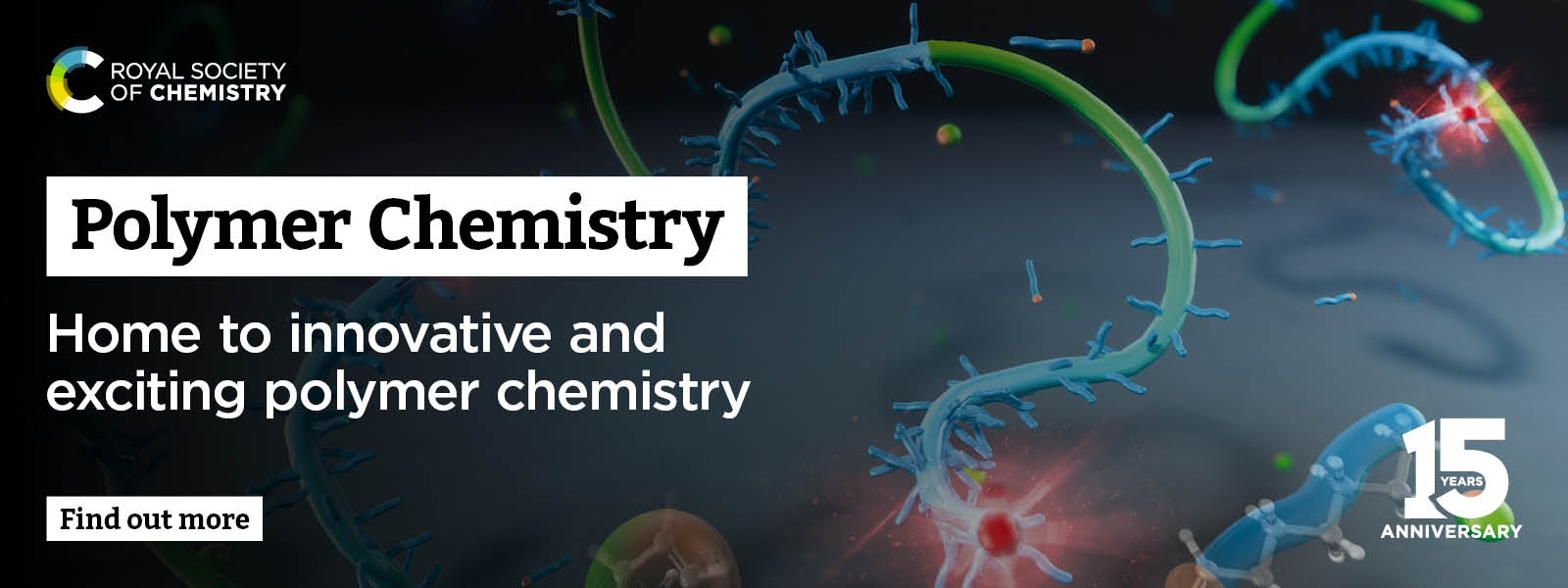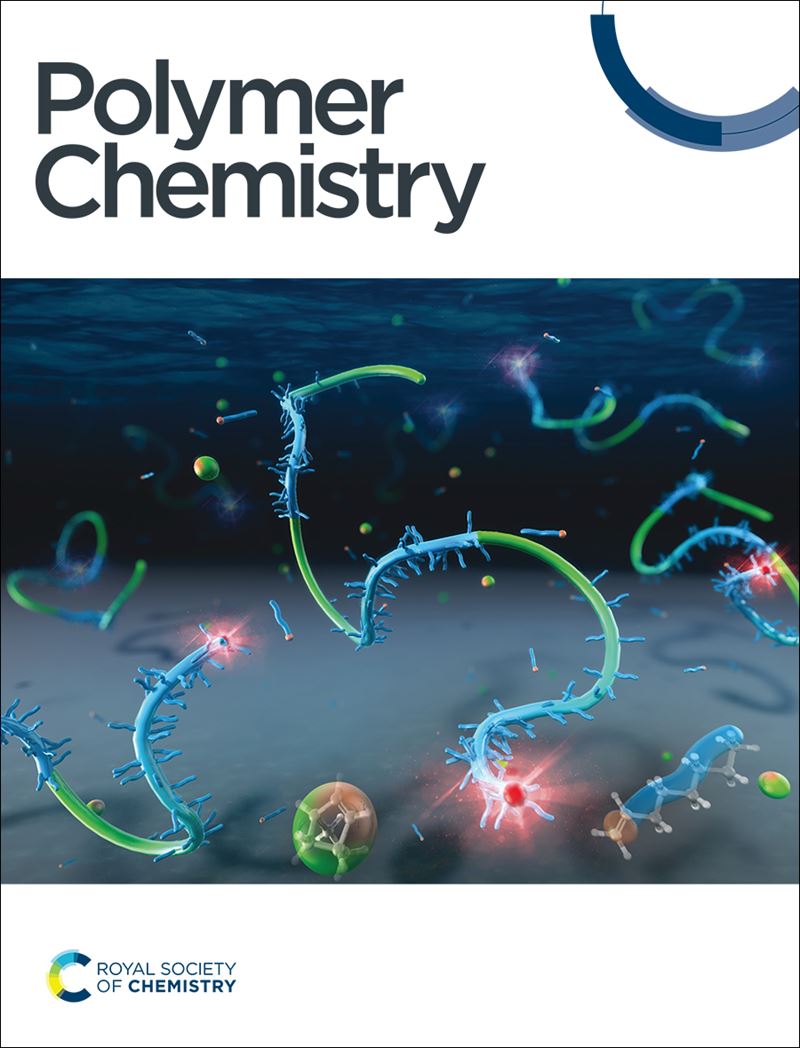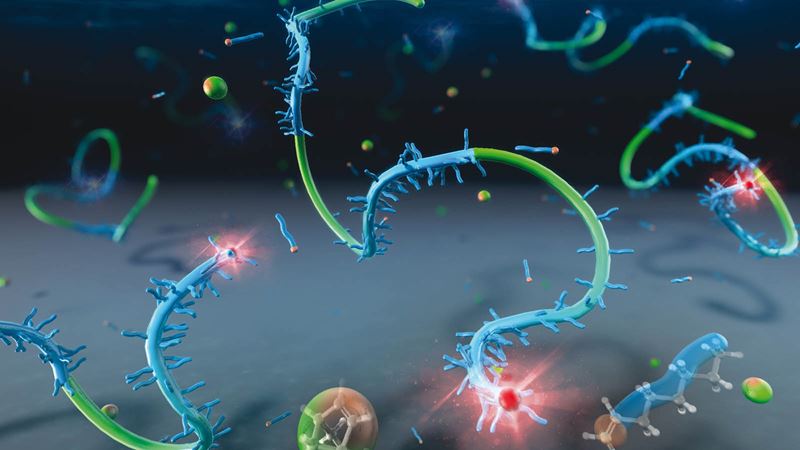You can find details about how to access information remotely in this step-by-step guide. The guide will also help if for any reason you have difficulty accessing the content you want.

What would you like to know about this journal?
Impact factor: 4.1*
Time to first decision (all decisions): 11.0 days**
Time to first decision (peer reviewed only): 27.0 days***
CiteScore: 8.6****
Editor-in-Chief: Christine Luscombe
Open access publishing options available
Scope
Polymer Chemistry welcomes submissions in all areas of polymer science that have a strong focus on macromolecular chemistry. Manuscripts may cover a broad range of fields, yet no direct application focus is required.
Manuscripts with a strong application focus might be more suitable for RSC Applied Polymers.

Polymer Chemistry: Editors talk about the journal
Polymer Chemistry Editors discuss their aspirations for the journal, what they are looking for in a paper, and how they approach the peer-review process.
Polymer Chemistry Lectureship
Nominations for the Polymer Chemistry Lectureship 2025 are now open and will close on 16 March 2025.
This Lectureship recognises early career researchers, typically within twelve years of attaining their PhD or equivalent degree, who have made significant contributions to the field of polymer chemistry in their independent academic career.
Find out more about eligibility, how to nominate, nomination deadlines, and see all the winners of this award.
Meet the team
Find out who is on the editorial and advisory boards for the Polymer Chemistry journal.
Editor-in-chief
Christine Luscombe, Okinawa Institute of Science and Technology, Japan
Associate editors
Athina Anastasaki, ETH Zurich, Switzerland
Filip Du Prez, Ghent University, Belgium
Holger Frey, Johannes Gutenberg University Mainz, Germany
Rongrong Hu, South China University of Technology, China
Rebekka Klausen, Johns Hopkins University, USA
Dominik Konkolewicz, Miami University, USA
Zhibo Li, Zhejiang University, China
Zi-Chen Li, Peking University, China
Haritz Sardon, University of the Basque Country, Spain
Journal specific guidelines
There are no specific requirements regarding formatting of submissions; we recommend using the Royal Society of Chemistry template but this is not a requirement for submission. All articles accepted for publication in our journals are edited and typeset to our house style by professional editors; we will format the final publication for you.
Characterisation guidelines
In addition to the general guidelines, authors are asked to provide the following data for the characterisation of polymers:
Analytical
For all soluble polymers an estimation of molecular weight must be provided by a suitable method. For example, size exclusion chromatography, including details of columns, eluents and calibration standards, intrinsic viscosity, MALDI TOF, etc.
For insoluble and crosslinked polymers, elemental analysis (within ±0.4% of the calculated value) is required to confirm sample purity and composition. For optoelectronic compounds, UV-visible data should be reported.
Physical
Important physical properties, such as Tg and Tm, should be included where appropriate.
Spectroscopic
For all soluble polymers full NMR characterisation (1H,13C) in support of the assigned structure, including relevant 2D NMR and related experiments (that is, NOE, etc) is required. Authors are encouraged to provide copies of these spectra in the Supplementary Information (SI).
For all polymers Infrared spectra that support functional group modifications, including other diagnostic assignments should be included.
Terminology
For information on the IUPAC recommendations for polymer nomenclature please see A Brief Guide to Polymer Nomenclature (PDF).
Open access publishing options
Polymer Chemistry is a hybrid journal and gives authors the choice of publishing their research either via the traditional subscription-based model or instead by choosing our gold open access option.
Gold open access
For authors who want to publish their article gold open access, Polymer Chemistry charges an article processing charge (APC) of £3,000 (+ any applicable tax). Our APC is all-inclusive and makes your article freely available online immediately, and permanently, and includes your choice of Creative Commons licence (CC BY or CC BY-NC) at no extra cost. It is not a submission charge, so you only pay if your article is accepted for publication.
Learn more about publishing open access.
Open access agreements
If your institution has an RSC open access agreement or APCs for gold open access, publishing in this journal may already be covered.
Use our journal finder to check if your institution has an open access agreement with us.
Please use your official institutional email address to submit your manuscript and check you are assigned as the corresponding author; this helps us to identify if you are eligible under an open access agreement or other APC discounts.
Traditional subscription model
Authors can also publish in Polymer Chemistry via the traditional subscription model without needing to pay an APC. Articles published via this route are available to institutions and individuals who subscribe to the journal. Our standard licence allows you to make the accepted manuscript of your article freely available after a 12-month embargo period. This is known as the green route to open access.
Readership information
Polymer chemists in industry and academia, plus materials scientists and bioscientists.
Subscription information
Polymer Chemistry is part of RSC Gold and Materials Science subscription packages.
Online only 2025: ISSN 1759-9962, £3,098 / $5,293
*2023 Journal Citation Reports (Clarivate Analytics, 2024)
**The median time from submission to first decision including manuscripts rejected without peer review from the previous calendar year
***The median time from submission to first decision for peer-reviewed manuscripts from the previous calendar year
****CiteScore™ 2023 available at www.scopus.com/sources
Polymer Chemistry
- Email:
- Send us an email
- Email:
- Send us an email
Share
Advertisement



